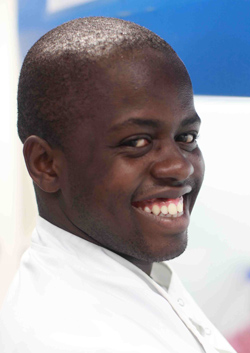Research interests
Infection with the malaria parasite is associated with significant morbidity and mortality that has resulted in the selection of important host genetic factors that are thought to confer a survival advantage against the debilitating effects of severe clinical malaria. Of interest most of these protective factors are associated with the red blood cell, an important stage during the life cycle of the malaria parasite. The best studied of these include the haemoglobin disorders of sickle cell trait and α+thalassaemia. Recent evidence however shows that co-inheritance of these conditions, common in malaria endemic areas, is associated with loss of the individual malaria protection associated with each condition individually. My work involves investigating biological mechanisms that may explain this negative interaction specifically looking at the effect of co-inheritance on the important parasite virulence phenotypes of cytoadherence, rosetting, and erythrocyte PfEMP1 and knob expression. I am also investigating the role of other red cell associated host genetic factors including the ABO blood group antigens and the complement receptor 1 expressed on the surface of red cells on malaria pathogenesis. Using different cohorts from malaria endemic coastal Kenya and Mali in West Africa I am carrying out both case-control and prospective longitudinal studies examining their association with malaria and additionally other non-malaria related illnesses commonly occurring in these populations. This work also extends in to investigating in-vitro correlates for the associations seen with these polymorphisms and malaria in the field studies.
Thesis title: Polymorphisms of the Red Blood Cell surface and their association with malaria
CV
2002 – 2006
- BSc in Biochemistry and Zoology, University of Nairobi, Kenya
2007
- Research Intern Kemri-Wellcome Trust Research Programme, Kilifi, Kenya
2007 – 2008
- MRes Advanced Genetic Analysis, University of Leeds, UK
2009 – Present
- PhD Student, KEMRI-Wellcome Trust Research Programme/University of Edinburgh, UK

